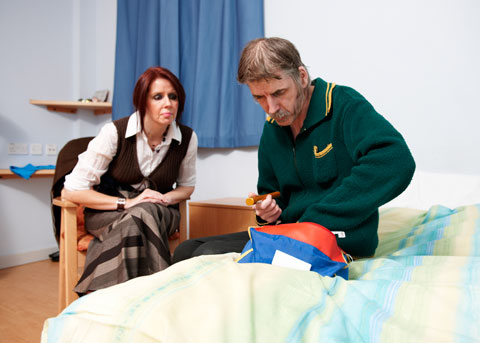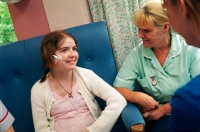An Introduction to Compassion - Part I: The Nature of Compassion for Allied Health



his session considers the theory of compassion and applies it to compassionate care through a model of the compassionate mind. It considers the benefits of delivering compassionate care and identifies the core attributes and skills needed to deliver this.
Learning Objectives
By the end of this session you will be able to:
- Describe compassion and the model of 'the compassionate mind'
- Discuss the theory versus reality of delivering compassionate care
- Describe the term 'suffering' and list the core attributes needed to engage with those who are 'suffering'
- Describe 'compassionate care' and identify the skills and attributes needed to develop it in practice
- List the benefits of compassion in clinical practice
The public rightly expects health and care staff to engage with them competently and confidently in a consistent manner throughout life. After competence, service users repeatedly identify the most important element for them is how things are done. Care can be delivered with compassion and kindness or without: it takes no longer either way, but service user and staff satisfaction with care is greatly enhanced when compassion and kindness are integral. This e-learning package supports the aspirations of Compassion in Practice [1] which are to 'maximise our contribution to high quality, compassionate care and to achieve excellent health and well-being outcomes'.
The Francis Report [2/3/4] into the events at Mid Staffordshire NHS Foundation Trust tells a story of appalling and unnecessary suffering. Hundreds of people were failed by a system that put corporate self-interest and cost control ahead of service users and their safety. Such events can never be allowed to happen again. Francis recommends that all health and care services put the service user first and keep him at the very centre of everything that happens. This should be supported by a set of standards that are easily understood and accepted by service users, the public and healthcare staff. A breach of these standards should never be tolerated.
Before starting this session you should:
- Consider your own definition of compassion and compassionate care
- Have a basic knowledge of dignity in care delivery
- Have some understanding of person-centred care
Janina M Sweetenham, MA, Dip N(London), Dip Ed., Dip N Ed.
An ITU nurse by background, Janina has spent 40 years in practice, education, leadership and management in the NHS, universities and the charity sector. She has a master’s degree in the psychology of education and has helped a wide range of health professionals explore the use of self in engaging with others. The way in which individuals think and judge themselves directly affects the way in which they relate to others.
Whilst working for the Yorkshire Regional Health Authority, Janina pioneered the introduction of the leadership and empowerment programme, now known as ’LEO’ and run throughout the country as one of the leadership development programmes of choice for the health service.
In the nineties, Janina designed and wrote the text for a series of e-learning modules on the Activities of Daily Living for a private company, and worked with their IT specialists finalising the materials for use in health and social care settings.
Janina has a keen interest in ensuring care is given with compassion and kindness, and, together with Sue Smith has created The Caring Behaviours Assurance System which is currently rolling out across a number of NHS organisations.


Dr Susan Smith – DBA, MBA, BScHons Nursing, RHV, RM , RN, FWT
Susan has over 40 years’ experience at the sharp end of operational and executive leadership positions in health and social care, community and mental health settings. Susan is a nurse, midwife and health visitor and in her role as Director of Nursing, she was involved in all issues relating to health promotion.
Sue has worked in the private sector for a company called VEGA which specialised in e-learning and space technology.
She led one of the largest leadership development programmes (90,000 participants) in Europe for the National Health Service Leadership Centre in her role as Director at the University of Leeds. Susan has provided personal development coaching to executive directors across the UK and Ireland and has a portfolio of 360 diagnostic tools to support her practice. These tools include Leadership Effectiveness Analysis (LEA), Margerison McCann and the NHS Leadership Qualities Framework (LQF). Sue is a Neuro Linguistic practitioner and is an accomplished academic, and has completed her Doctorate in Business Administration.
Having a longstanding interest in compassionate care, Sue has worked with Janina to create ’The Caring Behaviours Assurance System’ which is currently rolling out across a number of NHS organisations.
- Partner Notification course for Allied Health
- Posted By eIntegrity Healthcare e-Learning
- Posted Date: 2024-11-01
- Location:Online
- The session will explore the principles, practical application and various ways of carrying out part...
- STI Management course for Allied Health
- Posted By eIntegrity Healthcare e-Learning
- Posted Date: 2024-11-01
- Location:Online
- This session gives an overview of the current management of commonly encountered sexually transmitte...
- STI Testing course for Allied Health
- Posted By eIntegrity Healthcare e-Learning
- Posted Date: 2024-11-01
- Location:Online
- This session will cover testing for common sexually transmitted infections (STIs) and blood-borne vi...
- Unintended Pregnancy and Abortion course for Allie...
- Posted By eIntegrity Healthcare e-Learning
- Posted Date: 2024-11-01
- Location:Online
- This session discusses unintended pregnancy, how to conduct a consultation with women seeking aborti...
- Epidemiology and Transmission of STIs course for A...
- Posted By eIntegrity Healthcare e-Learning
- Posted Date: 2024-11-01
- Location:Online
- This session describes the epidemiology, risk factors, signs, symptoms and complications of common s...







